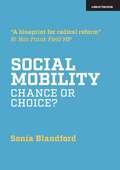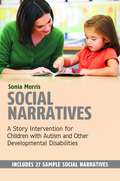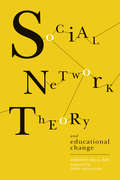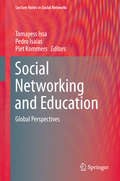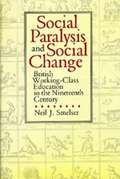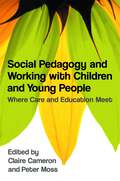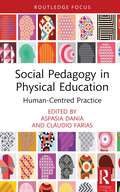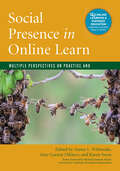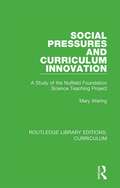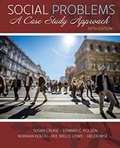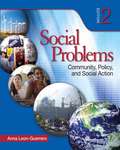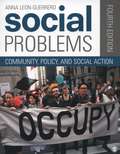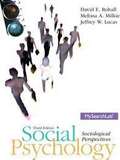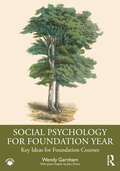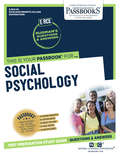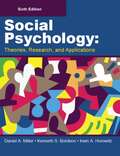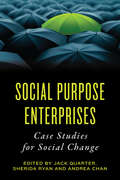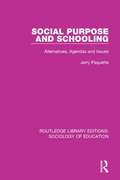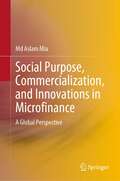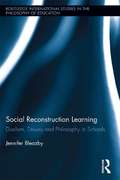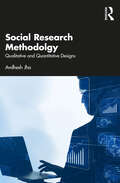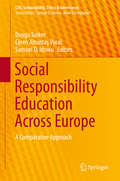- Table View
- List View
Social Mobility: Chance or Choice?
by Sonia BlandfordSocial Mobility: Chance or Choice?, a sequel to `Born to Fail? Social Mobility, a Working Class View' (October 2017), sets out the current chances and choices available for those considered by the establishment to need social mobility. Revisiting mutuality, Sonia Blandford asks whether we care enough as a society by considering the issues, solutions and impact to the education and social issues that push against the chance or choice of social mobility. Citing the views from interviews with education and business leaders, Social Mobility: Chance or Choice? reflects on the changing skillsets and capacities of workers required by employers, business and industry and the inescapable conclusion that the skillsets and capacities will continue to change in ways that are almost impossible for us to predict. In these contexts, we must question whether the traditional acme and 'recognised journey' of educational achievement – maximising university entrance – is still relevant or useful for working-class children and young people and children facing disadvantage. Apprenticeships, at their best, can offer an updated and forward-facing solution to the providing choice for working-class and all children and young people. Despite current policy developments to encourage meaningful apprenticeships, apprenticeship programmes are experiencing challenges. Social Mobility: Chance or Choice? argues that applied learning and work-based learning should be more accessible and available to all children and young people. If we are serious about unleashing the talent of all children and young people, regardless of their background, challenges or needs, we must consider new and innovative approaches to post-14 education. If we are to unleash the potential of all children and young people, the role of Further Education needs to be respected and understood. Quality Further Education and training in partnership with business is a credible answer to social mobility. Further Education is an underused but ideally placed sector to develop meaningful change for working-class young people, providing real chances and choices. Beginning with Leaders - professionals, practitioners, parents or carers, and members of society have a shared responsibility to ensure that all children and young people have a right to chance or choice and support these opportunities. Building a society that is truly inclusive.
Social Narratives: A Story Intervention for Children with Autism and Other Developmental Disabilities
by Sonia MorrisSocial Narratives are a simple, evidence-based intervention to help children with autism spectrum disorders (ASD) and other developmental delays to understand appropriate social behaviours and overcome the anxiety associated with social situations. This practical guide explains how to create and use personalised Social Narratives with children aged 4+. Drawing on the latest autism theory and findings from research, the author provides step-by- step guidelines for writing and using Social Narratives at home or in the classroom. She describes clearly the key components of the approach, including incorporating the interests of the child, using literal and positive language and including visuals and comprehension questions to support learning. 27 sample Social Narratives are also included, to provide inspiration and useful examples of how Social Narratives can be used in practice. Perfect for improving social behaviour in children with ASD, this book will be a valuable resource for teachers, speech and language therapists, occupational therapists and educational psychologists, as well as parents.
Social Network Theory and Educational Change
by Alan J. Daly Judith Warren LittleSocial Network Theory and Educational Change offers a provocative and fascinating exploration of how social networks in schools can impede or facilitate the work of education reform. Drawing on the work of leading scholars, the book comprises a series of studies examining networks among teachers and school leaders, contrasting formal and informal organizational structures, and exploring the mechanisms by which ideas, information, and influence flow from person to person and group to group. The case studies provided in the book reflect a rich variety of approaches and methodologies, showcasing the range and power of this dynamic new mode of analysis. An introductory chapter places social network theory in context and explains the basic tools and concepts, while a concluding chapter points toward new directions in the field. Taken together, they make a powerful statement: that the success or failure of education reform ultimately is not solely the result of technical plans and blueprints, but of the relational ties that support or constrain the pace, depth, and direction of change. This unique volume provides an invaluable introduction to an emerging and increasingly important field of education research.
Social Network Theory and Educational Change
by Alan J. DalySocial Network Theory and Educational Change offers a provocative and fascinating exploration of how social networks in schools can impede or facilitate the work of education reform. Drawing on the work of leading scholars, the book comprises a series of studies examining networks among teachers and school leaders, contrasting formal and informal organizational structures, and exploring the mechanisms by which ideas, information, and influence flow from person to person and group to group. The case studies provided in the book reflect a rich variety of approaches and methodologies, showcasing the range and power of this dynamic new mode of analysis. An introductory chapter places social network theory in context and explains the basic tools and concepts, while a concluding chapter points toward new directions in the field. Taken together, they make a powerful statement: that the success or failure of education reform ultimately is not solely the result of technical plans and blueprints, but of the relational ties that support or constrain the pace, depth, and direction of change. This unique volume provides an invaluable introduction to an emerging and increasingly important field of education research.
Social Networking and Education
by Pedro Isaias Tomayess Issa Piet KommersThe present work is intended to assist academics, researchers and proponents of online learning and teaching. Academics will be able to share the findings presented in this book, and the Social Networking and Education Model (SNEM), with their students (i. e. Masters and PhD). It is envisaged that this book will assist researchers and anyone interested in online learning to understand the opportunities and risks associated with the use of Social Networking in the education sector, and assist them to implement SN by means of the new SNEM model. The reader will benefit from our examinations of the risks and opportunities associated with the use of Social Networking in the education sector in various regions around the world: Asia-Pacific, Europe, Mediterranean, America, Middle East and the Caribbean. In addition, a Social Networking and Education Model (SNEM) will be developed to promote and implement Social Networking in the education sector.
Social Paralysis and Social Change: British Working-Class Education in the Nineteenth Century
by Neil J. SmelserA comprehensive history of how working-class education in nineteenth-century Britain--often paralyzed by class, religious, and economic conflict--struggled forward toward change.
Social Pedagogy and Working with Children and Young People
by Claire Cameron Peter MossSocial pedagogy is an innovative discipline that supports children's upbringing and overall development by focusing on the child as a whole person. It has been described as where education and care meet or as 'education in its broadest sense'. This book provides a comprehensive overview of the theory, principles and practice of social pedagogy and the profession of social pedagogue. With chapters from leading international contributors, it outlines the roots of social pedagogy and its development in Europe, and its role in relation to individuals, groups, communities and societies. Also covered is how it applies in practice to working with children and young people in a variety of settings, including children in care and in need of family support, and its potential future applications. This seminal book on an increasingly important topic will be essential reading for all academics, researchers and practitioners working with children.
Social Pedagogy in Physical Education: Human-Centred Practice (Routledge Focus on Sport Pedagogy)
by Cláudio Farias Aspasia DaniaThis is the first book to examine social pedagogy within the context of physical education, enabling more inclusive, and meaningful educational experiences for all students. It introduces the key concepts of social pedagogy and outlines practical strategies for implementing social pedagogy in physical education.Written by a team of leading international scholars and practitioners, this book assesses the research base for social pedagogy and explores how social pedagogy can be embedded in the physical education curriculum, in teaching and in assessment. Every chapter includes vignettes from both school and after‑school contexts and features a practitioner voice, from a teacher or a community member. This book also looks at social pedagogy in the context of key themes across physical education, from digital assessment methods and systems thinking, to models‑based approaches and physical education teacher education. As the chapters of this book unfold, the reader gets to know how to apply social pedagogy as a framework for physical education, choose strategies to enable human‑centred practice, and use assessment to align the curriculum with social pedagogy principles.This book makes a major contribution to our understanding of teaching and learning within physical education as processes of interacting for a good life though communication, connection, contribution, and creation. Concise, practical, and full of real‑world examples, this is essential reading for any student, pre‑service and in‑service physical education teacher, or coach working with children or young people across various educational levels and country contexts.
Social Photography: Make All Your Smartphone Photos One in a Billion
by Daniela BowkerHot photo apps come and go, but the practice of shooting and sharing is universal and is now a fundamental part of the way that we communicate with each other. Photos aren't printed on paper anymore - they are displayed on screens; and everywhere they are shown, the viewer is invited to like or share. Social Photography will show you how to create photos that will be clicked on, liked, shared, and - if you want - go viral. A must-read for anyone who takes their online presence seriously, this book will show you how to give your photos a fresh look, give you hundreds of posing and shooting ideas, and let you share your life's most exciting moments wider than ever before.
Social Presence in Online Learning: Multiple Perspectives on Practice and Research (Higher Education Ser.)
by Karen Swan Michael Grahame Moore Charlotte Nirmalani Gunawardena Aimee L. Whiteside Amy Garrett DikkersPublished in Association with 2020 AECT Division of Distance Learning Book AwardSocial presence continues to emerge as a key factor for successful online and blended learning experiences. It is commonly described as the degree to which online participants feel connected to one another. Understanding social presence—with its critical connections to community-building, retention, and learning outcomes—allows faculty and instructional designers to better support and engage students. This volume, Social Presence in Online Learning, addresses the evolution of social presence with three distinct perspectives, outlines the relevant research, and focuses on practical strategies that can immediately impact the teaching and learning experience. These strategies include creating connections to build community, applying content to authentic situations, integrating a careful mix of tools and media, leveraging reflective and interactive opportunities, providing early and continuous feedback, designing with assessment in mind, and encouraging change in small increments. Because student satisfaction and motivation plays a key role in retention rates and because increased social presence often leads to enriched learning experiences, it is advantageous to mindfully integrate social presence into learning environments.Social Presence in Online Learning brings together eminent scholars in the field to distinguish among three different perspectives of social presence and to address how these viewpoints immediately inform practice. This important volume: • Provides an overview of the evolution of social presence, key findings from social presence research, and practical strategies that can improve the online and blended learning experience• Differentiates three distinct perspectives on social presence and explains the ideas and models that inform these perspectives• Explores specific ways in which social presence relates to course satisfaction, retention, and outcomes• Offers practical implications and ready-to-use techniques that are applicable to multiple disciplines• Introduces current research on social presence by prominent researchers in the field with direct inferences to the practice of online and blended learning • Looks at future directions for social presenceSocial Presence in Online Learning is appropriate for practitioners, researchers and academics involved in any level of online learning program design, course design, instruction, support, and leadership as well as for graduate students studying educational technology, technology-enhanced learning, and online and blended learning. It brings together multiple perspectives on social presence from the most influential scholars in the field to help shape the future of online and blended learning.
Social Pressures and Curriculum Innovation: A Study of the Nuffield Foundation Science Teaching Project (Routledge Library Editions: Curriculum #35)
by Mary WaringOriginally published in 1979. This book is a study of the problems of functional and ideological adaptation of the curriculum in response to social change, based on a close investigation of a particular significant curriculum innovation, set up in 1962: the Nuffield Foundation Science Teaching Project. The book focuses particularly on the development of the O-level chemistry curriculum, which was one of the three founding projects. If sensible decisions are to be made about curriculum development, now and in the future, it is vitally important that we take account of the history of influential curriculum projects. This book deals thoroughly with the various political, social and educational factors influencing the setting up of the Nuffield Foundation Science Teaching Project, the details of its execution (methods, the influence of pressure groups, and of particular individuals) and its outcomes. The content of the secondary curriculum is a perennial topic of interest and this book is a stimulating aid to clear thinking not only as history.
Social Problems: A Case Study Approach
by Norman Dolch Helen Wise Edward Polson Neller Ree Wells-Lewis Susan CruiseSocial Problems: A Case Study Approach Fifth Edition by Norman Dolch, Helen Wise, Edward Polson, Neller Ree Wells-Lewis, and Susan Cruise.
Social Problems: Community, Policy, and Social Action (2nd edition)
by Anna Leon-GuerreroThe text focuses on inequalities, examining how race and ethnicity, gender, social class, sexual orientation, and age determine our life chances. Each chapter includes a discussion of relevant social policies or programs and highlights how individuals or groups have made a difference in their communities.
Social Problems: Community, Policy, and Social Action Fourth Edition
by Anna Y. Leon-GuerreroThe approach offered by this book is threefold: 1. ) to humanize the social problems with voices of experience, i.e. the poverty stricken, to the voices of change, i.e. the social workers, policy makers, student community volunteers; 2. ) each chapter will address the consequences and responses to a social problem; 3. ) to provide an effective platform for discussion thru the use of boxed features, learning checks integrated into chapter presentations, discussion questions, and the use of a limited virtual classroom on a companion website. The hallmarks of the book will be its integrated theme of race, class, and gender; emphasis on 'service learning' (which focuses on student awareness of effective community responses to social problems); critical thinking and active learning thru the text presentation and pedagogy to go beyond the often disheartening parade of social problems; and the use of the internet and unique print supplements to expand on what is intended to be a briefer book than most. The book is intended to have a strong U. S. focus with a global perspective interwoven where appropriate. Social Problems offers the following unique features and benefits: Voices in the Community a section in each chapter offering testimony from those experiencing or doing something about social problems Visual Essays in each section to highlight a particular social problem or solution in the context of actual family and individual experiences. Chapters will have photos interspersed. Internet and community exercises at the end of each chapter to present the opportunity for further research and to give students a chance to explore chapter concepts in a direct way in the community What Does it Mean to Me? A feature intended to bring the analysis of the problem being studied down to the level of the individual. Inclusion of four theoretical perspectives for each problem studied: conflict, social interactionist, functionalist and feminist perspectives End of chapter Community, Policy and Social Action sections focus on social policy, advocacy, and community innovation in response to social problems. This feature encourages students to examine and become a part of their own community. This is a unique, service learning-oriented benefit taking students out of the classroom, away from their texts, and into their community. Podcasts recorded by the author for each chapter reviews concepts and focuses on a specific case study.
Social Psychology
by David Rohall Melissa Milkie Jeffrey LucasDetails the contributions of sociology to the field of psychology. <P><P> Written by a team of sociologist, Social Psychology: Sociological Perspectives, 3/e introduces readers to social psychology by focusing on the contributions of sociology to the field of social psychology. The text discusses the field of sociological social psychology in terms of its three major dimensions: symbolic interactionism, social structure and personality, and group processes. Within each chapter, each major topic is examined from each of these perspectives. <P><P> This text is available in a variety of formats – digital and print. Pearson offers its titles on the devices students love through CourseSmart, Amazon, and more. To learn more about our programs, pricing options and customization, click the Choices tab.
Social Psychology for Foundation Year: Key Ideas for Foundation Courses
by Wendy GarnhamIntroducing students to topical issues and controversies drawn from specific areas of social psychology, Social Psychology for Foundation Year answers a series of contemporary questions and debates by bringing together current theories and studies from a number of areas within the field.Aimed primarily at students starting out on their degree journey, this book demonstrates how psychological research can help us understand our social world. Exploring topics from the Obama effect to groupthink, from what makes a good leader to the role of social identity in riots, it demonstrates how theories and studies contribute to our understanding of human behaviour. It embraces both established theories and recent empirical evidence to enable readers to see how research is linked to practical application in psychology and empowers readers to develop a greater understanding of why we do the things we do.Social Psychology for Foundation Year is a key textbook for both foundation year and introductory psychology courses and will be of interest to anyone wanting to delve into topical issues in contemporary psychology.
Social Psychology, M.A.Previous Psychology Paper-II, SDE AU
by Dr V. Harilakshmi Dr Veena Sairam B. NaliniThis is the prescribed textbook to the students of MA Previous Psychology Paper-2 for the subject Social Psychology, at School of Distance education, Andhra University
Social Psychology: Passbooks Study Guide (Excelsior/Regents College Examination Series)
by National Learning CorporationThe Excelsior/Regents College Examinations (E/RCE) offer you an opportunity to obtain recognition for college-level learning and consists of exams designed to demonstrate achievement and mastery of various college-level subjects, such as the Arts and Sciences, Business, Criminal Justice, Education, Health and Nursing. The E/RCE Social Psychology Passbook® prepares you by sharpening knowledge of the skills and concepts necessary to succeed on the upcoming exam and the college courses that follow. It provides a series of informational texts as well as hundreds of questions and answers in the areas that will likely be covered on your upcoming exam.
Social Psychology: Theories, Research, and Applications
by Daniel Miller Kenneth Bordens Irwin HorowitzSocial Psychology is a comprehensive and balanced introduction to Social Psychology and its many applications. The text is organized around a sociohistorical framework that links historical and cultural events to social psychological theory. This framework encourages critical thinking, stimulates awareness of intercultural differences, and enables students to understand social psychology in the context of their own lives and in world events. The core text and supplements are carefully crafted to work together to benefit both instructor and student.
Social Purpose Enterprises
by Jack Quarter Sherida Ryan Andrea ChanSocial Purpose Enterprises: Case Studies for Social Change presents case studies of twelve organizations that operate in a growing niche within the Canadian social economy: market-based entities supported by a nonprofit organization and operated for the benefit of a workforce who lives on the margins of society.Using a variety of research methods, the contributors examine the work of social purpose enterprises in a range of businesses including food service, child care, furniture, courier services, and microfinance. Combining the experience of academics and practitioners, each chapter analyses the economic, social, and policy implications of the case.Building on research published in Researching the Social Economy (2010) and Businesses with a Difference (2013), Social Purpose Enterprises provides a valuable resource for those involved in the growing push to encourage market-based solutions for those on the social margins.
Social Purpose and Schooling: Alternatives, Agendas and Issues (Routledge Library Editions: Sociology of Education #43)
by Jerry PaquetteFirst published in 1991, this work critically analyses the competing claims about alternative arrangements for schooling. It does so in light of major popularly understood agendas for social and political purpose, and of the troubled and much less clearly understood assumptions and issues behind them. The book examines closely four generic types of arrangements for schooling in light of a comprehensive framework for understanding the publicness or privateness of schools, and the relationships between social and educational purpose. The book poses key questions about the meaning and purpose of schooling in the rapidly evolving social, demographic and technological realities of the time. It also probes fundamental assumptions, values and beliefs behind educational and public policy-making. In doing so, it offers a way to make sense of unorthodox arrangements for the provision and funding of schools.
Social Purpose, Commercialization, and Innovations in Microfinance: A Global Perspective
by Md Aslam MiaThis book analyses three key aspects of microfinancing, namely social purpose, commercialization and innovations and examines, through a global perspective, how these aspects helped and diverted microfinance institutions towards the attainment of their dual goals over the last twenty years. Since microfinance remains informal in nature for most economies, not all financial innovations are suitable for its needs. Hence, the arguments in the book put forth an important challenge to the advocates of innovations and subsequently highlight why MFIs should be cautious when integrating innovations to ensure its original promise. The book is based on empirical analysis by utilising the latest and global microfinance market data, rather than focusing on a specific region. Thus, the book bridges a gap in knowledge by unravelling detail of the social purpose, commercialization and innovations within the field of microfinance and will be a valuable resource for those exploring the dynamics of innovations in microfinance.
Social Reconstruction Learning: Dualism, Dewey and Philosophy in Schools (Routledge International Studies in the Philosophy of Education #29)
by Jennifer BleazbyThis volume argues that educational problems have their basis in an ideology of binary opposites often referred to as dualism, which is deeply embedded in all aspects of Western society and philosophy, and that it is partly because mainstream schooling incorporates dualism that it is unable to facilitate the thinking skills, dispositions and understandings necessary for autonomy, democratic citizenship and leading a meaningful life. Drawing on the philosophy of John Dewey, feminist pragmatism, Matthew Lipman’s Philosophy for Children program, and the service learning movement, Bleazby proposes an approach to schooling termed "social reconstruction learning," in which students engage in philosophical inquiries with members of their community in order to reconstruct real social problems, arguing that this pedagogy can better facilitate independent thinking, imaginativeness, emotional intelligence, autonomy, and active citizenship.
Social Research Methodology: Qualitative and Quantitative Designs
by Avdhesh JhaThis book provides unrivalled coverage of both quantitative and qualitative research methods, making it invaluable for anyone embarking on social research. Divided into five parts/sections, it introduces tools, techniques, critical aspects and knowledge of conducting social research, which include a detailed discussion about the basics of social research, social research problem, review of literature, hypothesis, sampling, research design, tools of research, statistics and report writing. The volume helps acquire knowledge, develop an understanding, apply the concepts in social research and curate checklists and rating scales designed to evaluate the statement of a problem, research proposal, hypothesis, different methods of research and writing research reports. It also includes a brief discussion about statistics, the style of reporting and the criteria for evaluating social research. This book will be a helpful reference/text for graduates, postgraduates, doctoral scholars and all those interested in societal development. It would also be useful to students, researchers and teachers of the various social sciences disciplines like psychology, sociology, education, social work and other allied subjects. It would be an invaluable companion to professionals and data scientists working in the field of analytics.
Social Responsibility Education Across Europe
by Samuel O. Idowu Duygu Turker Ceren Altuntaş VuralThis book provides a comprehensive and multi-facettedanalysis of the current state of social-responsibility education in various Europeancountries. It explores the different approaches toward CSR education acrossEurope by identifying each country's current practices and university courses,and by revealing the effect of these methods on future generations of leaders. Usinga quantitative research methodology, the book presents comparisons of thecurrent nature and implications of CSR education in a sample of 10 businessschools from Germany, Greece, Hungary, Italy, Latvia, Poland, the Netherlands,Portugal, Spain and Turkey.
